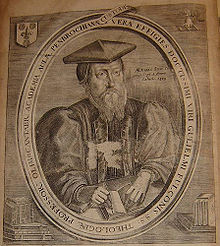- William Fulke
-
William Fulke (1538-1589) était un théologien puritain anglais.
Sommaire
Biographie
Il naquit à Londres et fit ses études au Collège Saint-Jean de Cambridge où il commença ses études en 1557-1558[1].
Après avoir étudié le droit pendant six ans, il fut admis dans le corps enseignant du Collège, Saint-Jean en 1564 [1]. Il prit une part importante dans la controverse sur les vêtements sacerdotaux, et persuada le collège de rejeter le surplis, ce qui lui valut une exclusion temporaire de Saint-Jean, mais en 1567 il y devint maître de conférences en hébreu et prédicateur.
Après avoir postulé, sans succès, pour la direction du collège en 1569, il devint aumônier de Robert Dudley, 1er comte de Leicester, et reçut de lui les prébendes de Warley, dans l'Essex, et de Dennington dans le Suffolk. En 1578, il fut élu master du Pembroke College de Cambridge.
En tant que controversiste puritain, il fut remarquablement actif ; en 1580 l'évêque d'Ely le désigna pour défendre le puritanisme contre les catholiques romains Thomas Watson, ex-évêque de Lincoln (1513-1584), et John Feckenham, ancien abbé de Westminster, et en 1581, il participa à la discussion avec le jésuite Edmund Campion, et en 1582 le Conseil privé le choisit parmi le clergé pour argumenter contre tout catholique.
Œuvres
On citera parmi ses nombreux travaux polémiques A Defense of the Sincere and True Translations of the Holy Scriptures into the English tongue, against the Manifold Cavils, Frivolous Quarrels, and Impudent Slanders of Gregory Martin, one of the Readers of Popish Divinity, in the Traitorous Seminary of Rheims[2] (Londres, 1583), et des réfutations de Thomas Stapleton (1535-1598), William Allen et d'autres controversistes catholiques[3]
Notes
- William Fulke, in Venn, J. & J. A., Alumni Cantabrigienses, Cambridge University Press, 10 vols, 1922–1958
- Une Défense des traductions sincères et véritables des Saintes Écritures en langue anglaise, contre les multiples arguties, les querelles frivoles et les impudentes calomnies de Gregory Martin, un des théologiens papistes du Séminaire des Traîtres à Reims.
- The Battle Over The Hebrew Vowel Points, Examined Particularly As Waged in England, by Thomas D. Ross, pp. 13-14. Ouvrage consultable en ligne.
Sources
- Cet article comprend du texte provenant d'une publication à présent dans le domaine public : Hugh Chisholm, éd (1911). Encyclopædia Britannica (Onzième édition.) Cambridge University Press.
- (en) Cet article est partiellement ou en totalité issu de l’article de Wikipédia en anglais intitulé « William Fulke » (voir la liste des auteurs)
Catégories :- Théologien anglican
- Naissance en 1538
- Décès en 1589
Wikimedia Foundation. 2010.

